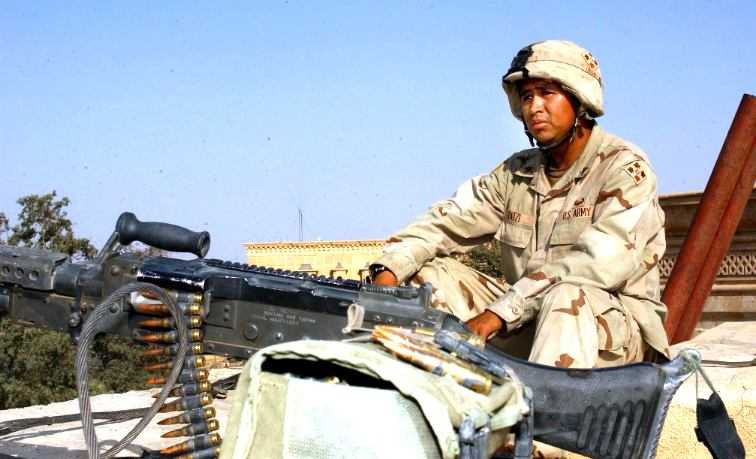![]() 1st Battalion 22nd Infantry
1st Battalion 22nd Infantry ![]()
Operation Iraqi Freedom
Mortar platoon
guards detainees, patrols Tikrit
By Staff Sgt. Craig Pickett
June 23, 2003

SGT Oscar Ipatzi keeps watch
on top the roof of his building
Photo by SSG Craig Pickett
TIKRIT, Iraq (Army
News Service, June 23, 2003) – Soldiers of the 1st
Battalion, 22nd Infantry Brigade’s Mortar Platoon assumed
they would have one job when they arrived in Iraq: to lob mortar
shells at the enemy.
Once there, however, their one job turned into three, and the
three jobs have nothing to do with mortars.
One of their three tasks is to man a detention facility for 1st
Brigade, 4th Infantry Division's area of responsibility. If the
military police or an infantryman detains an Iraqi, they are
brought to a small building on the north side of the palace
complex that serves as a holding cell.
Detainees come in at all hours of the day and night, sometimes
one at a time or in small groups. Sgt. Steve Jenkins is the
person in charge of processing them.
Searches are the first step in the detainment process. The person
being held, and his willingness to cooperate, determines how he
will be handled. "Every now and then we get an individual
who doesn't want to comply with the searches," said Jenkins.
"I come down here with an aggressive attitude," said
Sgt. Andrew Antolik, one of the soldiers who commonly searches
the new arrivals. "If they put up resistance, then I get
tough, but if they comply and allow the search, then I back
off."
Once they are searched, Jenkins itemizes all of the cash,
jewelry, or photos found on a detainee.
Jenkins, a native of Guymon, Okla., places the items into an
empty Meal-Ready-to-Eat bag and assigns it a number. The detainee
then gets a tape wristband with the same number to ensure he gets
his items back.
When not guarding the holding facility or processing detainees,
one or two soldiers must man an observation post on the roof of
their building 24 hours a day and look out over the Tigris River
to the far shore, watching for snipers and anything suspicious.
They also keep an eye on a bridge to the north to ensure no one
tries to cross.
Their third job is going on patrols through the city or setting
up traffic control points where they monitor traffic and search
suspicious vehicles. Either way, they get a chance to get out of
camp and interact with the locals.
"The toughest part is the language barrier," said Spc.
Jared Jablawski as he manned a .50-caliber machine gun while
providing security at a traffic control point. Jablawski and his
fellow soldiers are adapting and learning the language. They are
picking up key words to make their job easier. Words like open
and close and the basic parts of cars, like hood and door, make
the checkpoint run a little smoother, he said.
It is not always smooth, Jablawski said. Oftentimes during the
checkpoint, cars begin to back up and many try to cut in line in
front of others who have waited patiently. They start their own
line on the shoulder of the road in hopes the soldiers will check
them next and let them through.
"It's hard to get one line," Jablawski said, about the
cars lining up waiting for the checkpoint. "They are used to
doing things their own way."
One way they combat this, is to do what they call the
“Loopty-Loop.” This is a process where they let cars
cut and form their own line. Then, after an ample amount of cars
are on the shoulder trying to weasel into the main line, they
stop traffic and direct all the would-be line-cutters to the back
of the line.
Another way soldiers deal with the long hot days is to retreat to
their house.
The platoon lives in one of the many palaces along the Tigris
River. Their palace has floors of marble arranged in interesting
patterns. The walls rise up into a domed ceiling with intricate
filigree carvings and a beaded chandelier as its centerpiece. The
walls themselves are decorated with multiple moldings and the
same filigree as the ceiling.
This is where they call home, where they find solace after a long
day under the sweltering sun.
"The best thing we have is this house," said 1st Lt.
Colin Crow, platoon leader. "The more they improve their
house, the more livable it becomes. Morale continually goes up
with each improvement."
Members of the platoon recently pooled their money and purchased
a satellite dish from a local vender, said Crow. Now they can
watch television to help relax and pass the time. There are many
channels in English and they are able to catch a pretty good
movie every now and then.
Along with television, many pass the time writing letters home.
Jablawski said he is usually too tired to do much else at the end
of the day. "I like to write home to get into a different
mind set," he said.
Home is on everyone's mind, and when they are leaving is always
in debate. Rumors fly from one day to the next as to when they
will be headed home. Some of it is wishful thinking; some of it
is pessimistic at best. All agree they wish they knew a firm
date.
( Staff Sgt. Craig Pickett is a journalist
with the 350th MPAD, part of the 4th Infantry Division in Iraq.)
Home | Photos | Battles & History | Current |
Rosters & Reports | Medal of Honor | Killed
in Action |
Personnel Locator | Commanders | Station
List | Campaigns |
Honors | Insignia & Memorabilia | 4-42
Artillery | Taps |
What's New | Editorial | Links |